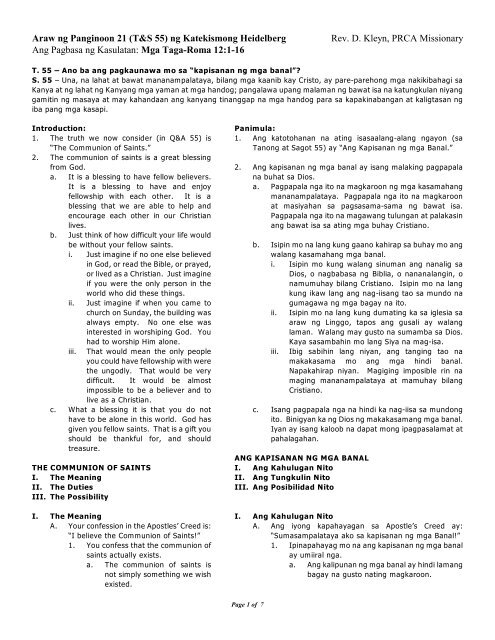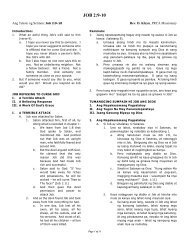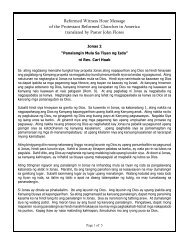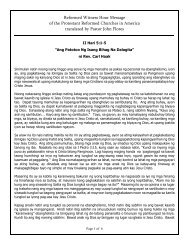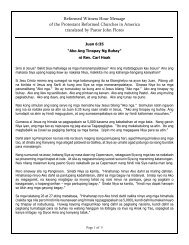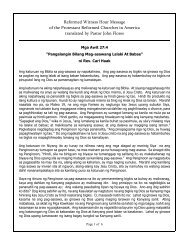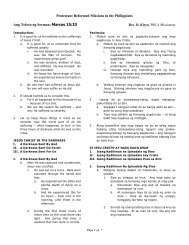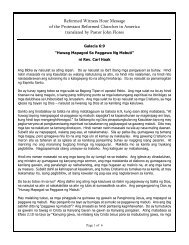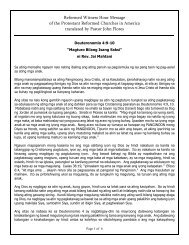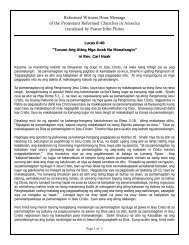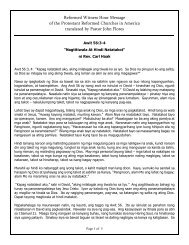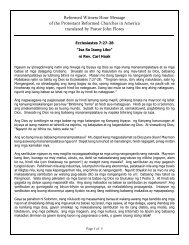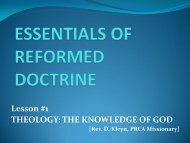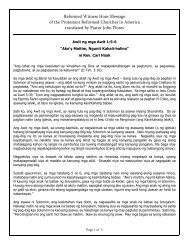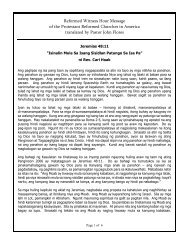You also want an ePaper? Increase the reach of your titles
YUMPU automatically turns print PDFs into web optimized ePapers that Google loves.
Stabilizing Wage PolicybyMordecai Kurz,Department of Economics Stanford University, Stanford, CA.(This version: May 27, 2015)Summary: A rapid recovery from deflationary shocks that result in transition to the Zero Lower Bound (ZLB) requires that policygenerate an inflationary counter-force. Monetary policy cannot achieve it and the lesson of the 2007-2015 Great Recession is that growingdebt give rise to a political gridlock which prevents restoration to full employment with deficit financed public spending. Even optimalinvestments in needed public projects cannot be undertaken at a zero interest rate. Hence, failure of policy to arrest the massive damage ofeight year’s Great Recession shows the need for new policy tools. I propose such policy under the ZLB called “Stabilizing Wage Policy”which requires public intervention in markets instead of deficit financed expenditures. Section 1 develops a New Keynesian model withdiverse beliefs and inflexible wages. Section 2 presents the policy and studies its efficacy.The integrated New Keynesian (NK) model economy consists of a lower sub-economy under a ZLB and upper sub-economywith positive rate, linked by random transition between them. Household-firm-managers hold heterogenous beliefs and inflexible wage isbased on a four quarter staggered wage structure so that mean wage is a relatively inflexible function of inflation, of unemployment and ofa distributed lag of productivity. Equilibrium maps of the two sub-economies exhibit significant differences which emerge from therelative rates at which the nominal rate, prices and wage rate adjust to shocks. Two key results: first, decline to the ZLB lower subeconomycauses a powerful debt-deflation spiral. Second, output level, inflation and real wages rise in the lower sub-economy if all basewages are unexpectedly raised. Unemployment falls. This result is explored and explained since it is the key analytic result that motivatesthe policy.A Stabilizing Wage Policy aims to repair households’ balance sheets, expedite recovery and exit from the ZLB. It raises basewages for policy duration with quarterly cost of living adjustment and a prohibition to alter base wages in order to nullify the policy. I usedemand shocks to cause recession under a ZLB and a deleveraging rule to measure recovery. The rule is calibrated to repair damagedbalance sheets of US households in 2007-2015. Sufficient deleveraging and a positive rate in the upper sub-economy without a wage policyare required for exit hence at exit time inflation and output in the lower sub-economy are irrelevant for exit decision. Simulations showeffective policy selects high policy intensity at the outset and given the 2007-2015 experience, a constant 10% increased base wages raisesequilibrium mean wage by about 5.5%, generates a controlled inflation of 5%-6% at exit time and attains recovery in a fraction of the timeit takes for recovery without policy. Under a successful policy inflation exceeds the target at exit time and when policy terminates,inflation abates rapidly if the inflation target is intact. I suggest that a stabilizing wage policy with a constant 10% increased base wagescould have been initiated in September 2008. If controlled inflation of 5% for 2.25 years would have been politically tolerated, the USwould have recovered and exited the ZLB in 9 quarters and full employment restored by 2012. Lower policy intensity would have resultedin smaller increased mean wage, lower inflation but increased recession’s duration. The policy would not have required any federal budgetexpenditures, it would have reduced public deficits after 2010 and the US would have reached 2015 with a lower national debt.The policy negates the effect of demand shocks which cause the recession and the binding ZLB. It attains it’s goal with strongtemporary intervention in the market instead of generating demand with public expenditures. It does not solve other long term structuralproblems that persist after exit from the ZLB and which require other solutions.JEL classification: D21, E12, E24, E3, E4, E52, E6, H3, J3, J6.Keywords: New Keynesian Model; wage scale; reference wage; inflexible wages; sticky prices;heterogenous beliefs; market belief; Rational Beliefs; Great Recession; Depression; monetary policy;Stabilizing Wage Policy.For Correspondence:Professor Mordecai KurzDepartment of Economics, Landau BuildingStanford UniversityStanford, CA. 94305 - 6072Email: mordecai@stanford.edu
. The catechism mentions this.It states that we are all“members of Christ” and “arein common, partakers of Him.”c. We all have the same Savior.Jesus is our Head, and we areHis body. He lives in everyone of us who belongs to Him.We are all united to Him, andthus to each other.3. Because we have Christ in common,also many other things in common.a. The catechism points this outwhen it says that “all andevery one, who believes, beingmembers of Christ, are incommon, partakers ... of allHis riches and gifts.”b. We all have the same Spirit.He does the same thing in us.He regenerates and sanctifiesus. Spirit makes all of us holy.c. We all have the same richesand blessings of salvation –same faith, hope, forgiveness,joy, peace, love, etc.d. We all have the samestruggles. Every day westruggle to hate sin, to fleefrom temptation, and to live agodly life.e. We all experience the samegrace of God. Every one of usknows how great God’s graceis – although we don’t deserveit, He forgives all our sins.f. We all strive for the samepurpose in life. We do not liveto please ourselves, but toglorify God.g. We all have the same truth –the truths of the Word of Godas summarized in ourReformed creeds.C. Because we have all these things incommon (and also many more things),we are attracted to each other.1. We want to be with those who arelike us.a. We do not want to be withthose who are ungodly andwicked and worldly. We wantto be separate from them – IICorinthians 6:14-18.b. We want fellowship with thosewho have the same spirituallife, blessings, truth, etc.b. Sinasabi ng katekismo ito. Isinasaad natayong lahat ay “mga kaanib kay Cristo” at“pare-parehong mga nakikibahagi sa Kanya.”c. Magkakatulad tayo ng Tagapagligtas. SiJesus ang ating Ulo, at tayo ang Kanyangkatawan. Nabubuhay Siya sa atin nakabilang sa Kanya. Iisa tayo sa Kanya, atganoon din tayong lahat.3. Dahil si Cristo ay nasa atin, marami din tayongmga bagay na magkakatulad.a. Binigyang-diin ito ng katekismo nang sabihinna “ang lahat at bawat mananampalataya,bilang mga kaanib kay Cristo, aypare-parehong mga nakikibahagi ... ng lahatng Kanyang mga yaman at mga handog.”b. Tayong lahat ay may magkakatulad naEspiritu. <strong>Ang</strong> ginagawa Niyang bagay sa atinay magkakapareho. Binibigyan Niya tayo ngbagong kalakasan at pinapaging-banal.Tayong lahat ay ginagawang banal ngEspiritu.c. Tayong lahat ay may katulad na kasaganaanat pagpapala ng kaligtasan – katulad napananampalataya, pag-asa, kapatawaran,kagalakan, kapayapaan, pag-ibig, atpb.d. Pare-pareho tayo na may nilalabanan.Bawat araw tayo ay lumalaban sa kasalanan,tumatakas sa tukso, at namumuhay na maykabanalan.e. Dinaranas nating lahat ang gayong biyaya ngDios. Nalalaman ng bawat isa kung gaanokadakila ang biyaya ng Dios – kahit hinditayo nararapat dito, pinatatawad Niya anglahat nating mga kasalanan.f. Nagsusumikap tayong lahat sa magkakatuladna layunin sa buhay. Hindi tayo nabubuhaypara bigyan ng kasiyahan ang sarili, kundiang luwalhatiin ang Dios.g. Tayong lahat ay may magkakatulad nakatotohanan – mga katotohanan sa Salita ngDios na nakabuod sa ating Reformed na mgakredo.C. Dahil nasa ating lahat na magkakatulad ang mga bagayna ito (gayon din ang marami pang mga bagay),nagugustuhan natin ang isa’t isa.1. Nais nating makasama ang mga kagaya natin.a. Ayaw nating makasama ang mga masasamaat maka-sanlibutan. Nais natin namahiwalay sa kanila – II Corinto 6:14-18.b. Nais nating makasama ang may katulad nabuhay-espiritual, may katulad napagpapalang-espiritual, may katulad nakatotohanan, atpb.Page 3 of 7
II.2. That is how God makes thecommunion of saints a reality.Everything that we have in commonis like a magnet that pulls ustogether and keeps us together asthe people of God.The DutiesA. Because we are part of the communionof saints, we also have duties andresponsibilities.1. The catechism says: “Every onemust know it to be his duty, readilyand cheerfully to employ his gifts,for the advantage and salvation ofother members.”2. Notice, first of all, that “every one”of us has this duty.a. You may not watch others andwonder why they do not usetheir gifts in the church.b. You may not say: “Why don’tothers help me, encourageme, and give things to me?”3. But it starts with yourself.a. You must say: “I have a dutyto use my gifts for benefit ofothers. And I have this dutytoward others even if they donot do one thing for me.”b. The communion of saintsmeans each of us realizes: “Itis MY duty and responsibilityto use MY gifts for theadvantage and salvation ofother members of the church!”4. Are you doing that?B. Each of us has received some uniquegifts and abilities from God.1. You might be inclined to think youdo not have any gifts.a. You might say: “Others havegifts, but I don’t have any.Others can do things in thechurch, but I’ve nothing tocontribute. I’m unwanted andunnecessary in the church.”b. But none of us should everthink that way. If we do, wewill cut ourselves off from ourfellow believers, and we willfail to be living and activemembers in the church.II.2. Ganyan ginagawa ng Dios ang kapisanan ng mgabanal na isang katotohanan. <strong>Ang</strong> lahat na merontayo ay isang magnet na humihila sa atin atnagpapanatili sa atin na magkakasama bilangbayan ng Dios.<strong>Ang</strong> Tungkulin NitoA. Dahil bahagi tayo sa kapisanan ng mga banal, maymga tungkulin din tayo at mga pananagutan.1. Sinasabi ng katekismo: “Dapat malaman ng bawatisa ang kanyang tungkulin, na may kahandaan atmasiyahan na isagawa ang kanyang mga kaloobpara sa pagsulong at kaligtasan ng bawat isangkaanib.”2. Una sa lahat, pansinin mo na “ang bawat isa” saatin ay may tungkuling ito.a. Hindi mo man marahil binabantayan ang ibapero nagtataka ka kung bakit hindi nilaginagamit ang kanilang mga kaloob saiglesia.b. Hindi mo dapat sabihin: “Bakit ayaw akongtulungan at palakasin ng iba, at bigyan nilaako?”3. Pero nagsisimula ito sa iyong sarili.a. Sasabihin mo: “May tungkulin ako na gamitinang aking mga kaloob para sakapakinabangan ng iba. At ako ay maytungkulin sa iba kahit pa wala silangginawang anuman sa akin.”b. <strong>Ang</strong> kapisanan ng mga banal ay maykahulugan na dapat nating isipin: “TungkulinKO at pananagutan KO na gamitin angAKING mga kaloob para sa kabutihan atkaligtasan ng ibang mga kaanib sa iglesia!”4. Ginagawa mo ba iyan?B. <strong>Ang</strong> bawat isa sa atin ay tumanggap ng magkakaibangmga kaloob at kakayahan mula sa Dios.1. Naiisip mo siguro na wala kang anumang mgakaloob.a. Sinasabi mo: “<strong>Ang</strong> iba, may kaloob, pero akowala. May magagawa ang iba sa iglesia,pero wala akong maibibigay na ambag.Hindi naman ako mahalaga at kailangan saiglesia.”b. Pero walang sinuman sa atin ang dapatmag-isip ng ganyan. Kung gagawin natiniyan, pinuputol natin ang sarili sa mga kapwamananampalataya, at mabibigo tayo namamuhay at maging aktibong mga kaanib saiglesia.2. Each of you must realize that Godhas given you unique gifts.2. Dapat isipin ng bawat isa na binigyan tayo ng Diosng kakaibang mga kaloob.Page 4 of 7
a. Perhaps you need to lookharder to discover what giftsGod has given you.b. Perhaps you need to take thetime to think about the needsthat others have.c. Perhaps you need to thinkmore about how you might beable to help others.3. Romans 12:6-8 speaks of somegifts. Ask yourself if you have thesegifts.a. Maybe you have the gift of“prophesy” – the ability tounderstand and explain God’sWord to others. If so, do youwitness? Do you bring comfortto those who suffer?b. Maybe you have the gift of“ministry” – the time andability to serve others. If so,do you visit and help andencourage the widows, orelderly, or afflicted?c. Maybe you have the gift of“teaching.” If so, do youteach your own children theBible? Do you speak aboutthe things of God to the youthand children in the church?d. Maybe you have the gift of“exhorting.” If so, do you talkto those who walk in sin? Doyou call them to come tochurch to hear Christ’s Wordand find forgiveness in Him?e. Maybe you have the gift of“giving.” If so, do you give tothe needy? Do you gladly givesome of what God has givenyou to the offerings that aretaken during worship?4. These are just a few examples ofgifts you may have. Do not be tooquick to say you do not have thesegifts. Everyone has some gifts –children and young people too.C. The catechism points out that we mustuse our gifts “for the advantage andsalvation of other members.”1. This first of all refers to helping ourfellow believers with their physicaland earthly needs.a. Romans 12:13-15 gives a gooddescription of what we shoulddo for each other.a. Siguro dapat mong hanapin para matuklasankung ano ang mga kaloob na ibinigay sa iyong Dios.b. Siguro kailangan mo ng panahon para pagisipanang patungkol sa mgapangangailangan ng iba.c. Siguro dapat mo pang isipin ang patungkolsa kung paano mo magagawang makatulongsa iba.3. Sinasabi ng <strong>Mga</strong> Roma 12:6-8 ang ilan sa mgakaloob. Tanungin mo ang sarili mo kung meronka ng mga kaloob na ito.a. Siguro ikaw ay may kaloob ng pagpo-“propesiya” – ang kakayahan na maunawaanat ipaliwanag ang Salita ng Dios sa iba.Kung ganoon, ikaw ba ay nagpapatotoo?Inihahatid mo ba ang pananalita ng kaaliwansa iba na nahihirapan?b. Siguro ikaw ay may kaloob ng pagmi-“ministeryo” – ang panahon at kakayahan namagsilbi sa iba. Kung ganoon, dinadalaw,tinutulungan at pinalalakas mo ba ang mgabalo, matatanda o nahihirapan?c. Siguro ikaw ay may kaloob ng “pagtuturo.”Kung gayon, tinuturuan mo ba ang mga batang Biblia? Ikaw ba ay nagsasalita patungkolsa Dios sa mga kabataan at mga bata saiglesia?d. Siguro ikaw ay may kaloob ng“pangangaral.” Kung gayon, sinasabihan moba ang mga lumalakas sa kasalanan?Tinatawagan mo ba sila na magpunta saiglesia para marinig ang Salita ni Cristo atmakasumpong ng kapatawaran sa Kanya?e. Siguro ikaw ay may kaloob ng “pagbibigay.”Kung gayon, nagbibigay ka ba sa mganangangailangan? Nagagalak ka ba naibigay kung ano ang ibinigay sa iyo ng Diossa paghahandog na nililikom sa panahon ngpagsamba?4. Ilan lamang ang mga ito sa halimbawa ng mgakaloob na siguro ay mayroon ka. Huwag kangmagmadali na magsabing wala kang mga kaloobna ito. <strong>Ang</strong> bawat isa ay may mga kaloob – kahitmga bata at kabataan rin.C. Binibigyan diin sa katekismo na dapat nating gamitinang ating mga kaloob “para sa kapakanan at kaligtasanng ibang mga kaanib.”1. Una sa lahat ito ay tumutukoy sa pagtulong sakapwa mananampalataya sa kanilang pisikal atpanlupang mga pangangailangan.a. <strong>Ang</strong> <strong>Mga</strong> Roma 12:13-15 ay nagbibigayng isang mabuting paglalarawan kung anoang ating gagawin sa iba.Page 5 of 7
. Do you do this? Do youespecially love and help thosewho are burdened and needy?2. But the most important thing to dowith your gifts is to seek the“salvation” of others.a. You must be focused on thespiritual needs of your fellowbelievers.b. You need to encourage yourfellow believers to be faithfulin reading the Bible andpraying.c. You need to remind yourfellow saints to come tochurch with you every Sunday.d. You need to speak comfortingwords to those who aretroubled, unhappy, ordepressed.e. You need to discuss the Bibleand sermons together, so youcan help each other growspiritually.f. These are very important.They are necessary for thesalvation of your fellow saints.D. There is one more thing you need to dofor your fellow believers: Pray for eachother! (Romans 12:12).1. You must pray every day that Godwould bless your fellow believers,that God would comfort them,forgive them, guide them, protectthem, save them, etc.2. Be sure to pray for other believers.And be sure to pray, every day,especially for those who aresuffering.3. When you pray for them every day,you will think about them everyday. And that will remind you tolook for specific ways in which touse your gifts to help them.III. The PossibilityA. First, the communion of saints is possibleonly if each of us is humble – Romans12:3.1. If you have a high opinion ofyourself, you will not be willing tohelp your fellow saints.2. If you think you are better thanothers, you will not be willing toserve your fellow believers.3. We need to put aside all our pride,and be humble children of God.b. Ginagawa mo ba ito? Minamahal attinutulungan mo ba lalo na silang mganabibigatan at nangangailangan?2. Pero ang pinakamahalagang bagay na gagawin saiyong mga kaloob ay naisin ang “kaligtasan” ngiba.a. Kailangan mong bigyan pansin ang espiritualna pangangailangan ng iyong kapwamananampalatayab. Kailangan mong palakasin ang iyong kapwamananampalataya na maging matapat sapagbabasa ng Biblia at pananalangin.c. Dapat mong ipaalala sa iyong kapwa mgabanal na magpunta sa iglesia kasama katuwing Linggo.d. Kailangan mong bigyan ng nakakaaliw namga pananalita ang mga nahihirapan,malulungkot, o nalulumbay.e. Kailangan mong kausapin ng magkakasamaang iba patungkol sa Biblia at sa sermon,para matulungan mo ang iba na lumago saespiritual.f. <strong>Ang</strong> mga bagay na ito ay napakahalaga.Kinakailangan ang mga ito para sa kaligtasanng iyong kapwa mga banal.D. May isa pang bagay na dapat mong gawin para saiyong mga kapwa mananampalataya: Ipanalangin angbawat isa! (<strong>Mga</strong> Roma 12:12).1. Dapat mong ipanalangin sa araw-araw napagpalain ng Dios ang kapwa momananampalataya, na aliwin sila ng Dios,patawarin, gabayan, ingatan, at iligtas sila.2. Tiyakin na ipanalangin ang bawatmananampalataya. At tiyakin na ipanalangin, saaraw-araw, lalo na silang mga nagdurusa.3. Kapag ipinanalangin mo sila sa araw-araw, iisipinmo ang patungkol sa kanila. At iyan angmagpapaalala sa iyo na tingnan ang mgakaparaanan na magagamit mo ang iyong mgakaloob para tulungan sila.III. <strong>Ang</strong> Posibilidad NitoA. Una, ang kapisanan ng mga banal ay posible lamangkung ang bawat isa ay mapagpakumbaba – <strong>Mga</strong>Roma 12:3.1. Kung mataas ang palagay mo sa sarili mo, hindika handang tumulong sa kapwa mo mga banal.2. Kung sa palagay mo ikaw ay mas magaling sa iba,hindi ka handang maglingkod sa iyong kapwa mgamananampalataya.3. Kailangan natin isantabi ang ating kayabangan, atmaging mapagpakumbabang mga anak ng Dios.Page 6 of 7
B. Secondly, the communion of saints ispossible only if each of us is loving –Romans 12:10.1. You must love Christ Jesus, Wholaid down His life to save you andmake you part of His body.2. If you love Him, you will also loveHis body. If you don’t, your love isnot genuine (I John 4:20).3. Love your fellow believers. Thenyou will be very willing to use yourgifts for their good.C. Thirdly, the communion of saints ispossible only if you remember who yourfellow believers are.1. Sometimes there is fighting anddisagreement between saints. Whydoes that happen?a. It happens because we focuson natural characteristics ofothers – their habits, actions,weaknesses, ideas, etc.b. We forget who they arespiritually. We forget they aremembers with us of the onebody of Christ. We forget thatin Christ we have many, manythings in common.c. We forget that God haschosen them and saved them.We forget that God lovesthem, and so should we.2. From a natural viewpoint, someonein church might be difficult to love.a. But you must say: “I am nobetter than others! I can bejust as stubborn and unloving!Perhaps my problem is thatI’m blind to it.”b. “But by God’s grace, we areone. We’re both precious toGod in Christ. We’re bothsaints – holy in God’s sight.”c. “Therefore I love my fellowsaint. And I will strive, in allmy dealings, to use my giftsfor his advantage andsalvation.”3. May we all strive to say and do this.Conclusion: Let’s be thankful for the communionof saints. May God cause us to be a blessing toeach other. And may God bless you always withunity and love and peace and good fellowship withone another in Jesus Christ.B. Pangalawa, ang kapisanan ng mga banal ay magigingposible lang kung ang bawat isa ay mapagmahal –<strong>Mga</strong> Roma 12:10.1. Dapat mong ibigin si Cristo Jesus, na Siyangnagbigay ng Kanyang buhay para iligtas ka atgawin kang bahagi sa Kanyang katawan.2. Kung minamahal mo Siya, mamahalin mo rin angKanyang katawan. Kung hindi, ang pag-ibig moay hindi totoo (I Juan 4:20).3. Ibigin mo ang iyong kapwa mananampalataya.Pagkatapos ikaw ay magiging handa namagpagamit sa iyong mga kaloob para sakanilang kabutihan.C. Pangatlo, ang kapisanan ng mga banal ay magigingposible lamang kung aalalahanin mo kung sino angiyong kapwa mananampalataya.1. Minsan may paglalabanan at di-pagkakasunduansa pagitan ng mga banal. Bakit ito nangyayari?a. Nangyayari ito dahil nakatuon tayo sa likasna katangian ng iba – kanilang mgakasanayan, gawa, kahinaan, kaisipan, atbp.b. Nalilimutan natin kung sino sila saespiritualidad. Nalilimutan natin na sila aykaanib na kasama natin sa iisang katawan niCristo. Nalilimutan natin na kay Cristo tayoay maraming-maraming pagkakatulad.c. Nalilimutan natin na pinili sila at iniligtas ngDios. Nalilimutan natin na minamahal sila ngDios, at gayon din dapat tayo.2. Mula sa natural na pananaw, may ilan sa iglesiana mahirap ibigin.a. Pero sasabihin mo: “Hindi ako mas magalingsa iba! Ako ay makulit at di-kaibig-ibig!Siguro ang problema sa akin, hindi ko itonakikita.”b. “Pero sa biyaya ng Dios, nagkakaisa tayo.Tayo ay kapwa mahahalaga sa Dios kayCristo. Tayo ay kapwa mga banal – banal samata ng Dios.”c. “Kaya nga minamahal ko ang aking kapwamga banal. At ako ay magpupunyagi salahat kong pakikitungo sa kanila, na gamitinang mga kaloob para sa kapakinabangan atkaligtasan nila.”3. Magsikap nawa tayo na masabi, at magawa ito.Pagtatapos: Maging mapagpasalamat tayo para sa kapisananng mga banal. Gawin nawa ng Dios na pagpalain ang bawat isa.At pagpalain nawa tayo ng Dios palagi kasama ng pagkakaisa atpagmamahal at kapayapaan at mabuting pakikisama kasama angbawat isa kay Jesu Cristo.Page 7 of 7


